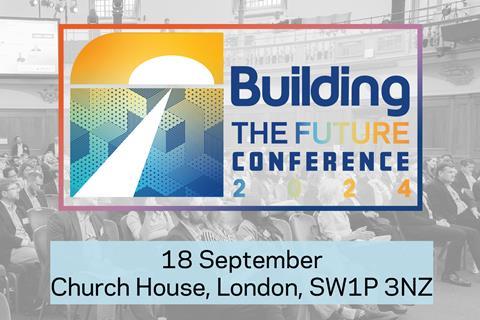The sector needs to act now if it is to address the other challenges it is facing, writes Andrew Jackson, chief executive, construction, Mace
Since starting as chief executive of the construction business at Mace, my colleagues at our head office in Moorgate haven’t seen much of me because I’ve been out-and-about visiting our sites.
I’ve made it my personal mission to get to as many of our projects in my first 90 days as possible, from the Netherlands to Ireland and everywhere in between, because frankly as contractors that is where we deliver our product.
On each visit, I’ve asked each leadership team about their productivity data – I think it’s important every site team knows this data well and has it to hand.

You can only improve what you measure, so if we want to become more productive as an industry, we need to do better at tracking data. We have dashboards coming out of our ears, but how effectively are we using this data to improve and become more productive?
However, a recent found that over one in five (22%) respondents from the UK and Ireland said they never measure labour productivity – the highest of the 5 global regions surveyed.
Is it any wonder, that the construction industry’s productivity levels have remained consistently below the UK average for so long? Can you imagine managers in the manufacturing sector saying they never measured productivity? When it comes to productivity, we need to sharpen up.
This is fast becoming not only a nice to have but a necessity. The UK construction workforce fell again in the second quarter of 2024 according to the Office for National Statistics (ONS).
We now have 2.04 million workers in construction – 5.1% lower than this time last year and the lowest level it’s been since the turn of the millennium.
This is likely to worsen later this year as many older workers retire with ‘grandfathering rights’ for CSCS cards coming to an end. We need to build in a leaner way because we simply don’t have the workforce numbers to do otherwise.
We’ve talked a good game about productivity for many years now, but with the amount of labour available reducing each year, and greater demands being placed on the industry on everything from building safety to carbon, it’s no longer optional
The industry has acknowledged the problem and there are various initiatives driving change. In 2020 the Construction Productivity Taskforce was launched, bringing together clients, contractors including Mace, supply chain and consultants to identify and trail new ways of making the sector more productive. This has resulted in the Private Sector Playbook, a measurement framework, and data trust.
More recently, the Construction Leadership Council (CLC) to close the productivity gap between construction and the rest of the UK by 2035. The CLC make the case that doing this offers ‘one of the biggest and most easily deliverable opportunities to grow the UK economy’, generating an additional £45bn of added value each year for the wider economy – equivalent of 2% of GDP.
With a in the public finances, if we can close construction’s productivity gap, we can help the government achieve its aim to ‘Get Britain �ڶ����� Again’ and contribute to the country’s economic growth.
But are we moving fast enough? I would argue we’re not. We need to shake-up the way we approach construction – we can’t just keep doing the same thing and expect different results. It’s been eight years since Mark Farmer’s ‘Modernise or Die’ but his vision has yet to be fully implemented.
Discussions around productivity tend to focus on outputs – how many widgets we produce an hour – but what we need to be focusing on is the inputs. Everything from design, to how we procure, even to the set up of our sites. We need a more ‘industrialised’ approach to construction – something we at Mace call ‘Construction to Production’.
An example of this is the student accommodation we are building for Chapter Living at London Bridge. Here we used our ‘Construction to Production’ approach to radically reduce the programme time by months, have 40% fewer deliveries to site and save 1,250 tonnes of embodied carbon.
We were able to achieve this by sharing a common vision with the client, architect and supply chain. I encourage other forward-thinking clients to think outside the box and consider how to implement different build strategies like this one to improve productivity. The more we can scale these approaches the greater the benefits.
We’ve talked a good game about productivity for many years now, but with the amount of labour available reducing each year, and greater demands being placed on the industry on everything from building safety to carbon, it’s no longer optional. We all need to sharpen up our game, but if we do, not only will we all benefit, but the wider economy will do to.
Andrew Jackson is CEO for Construction at Mace
�ڶ����� the Future Conference is back … at Church House, London, 18 September

Andrew Jackson will be exploring this topic more as a panelist at the �ڶ����� the Future Conference, which is set to return to central London on 18 September, bringing together leading industry experts to unpack the biggest issues facing the built environment.
Keynote speakers include Mark Robinson, chief executive, Scape Group, and Eoghan O’Lionaird, chief executive, Wates.
Our panel sessions focus on net zero, building safety and driving productivity on construction projects. They will be fully interactive, allowing you the chance to have your say, and put your questions to any of our expert speakers.
For attendees we will be launching three more research reports linked to the themes of the conference.


























No comments yet